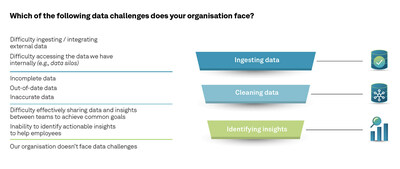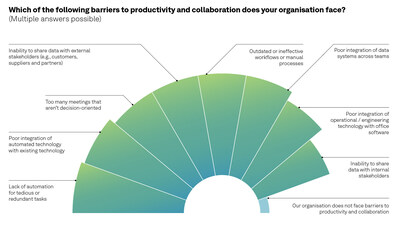98% manufacturers face data woes that stifle innovation and time to market, Hexagon's report reveals
- None.
- None.
Insights
Understanding the implications of data management in manufacturing is crucial for gauging the sector's future competitiveness and efficiency. The report highlights a near-universal struggle with data issues among manufacturers, which directly correlates with their ability to implement advanced technologies. This is significant because these technologies are not just incremental improvements; they represent transformative potential for operational efficiency, product development and ultimately, profitability.
The lag in adopting automation technologies by 40% of manufacturers indicates a potential divide in the industry. Companies at the forefront of data-driven productivity are likely to gain a competitive edge, reflected in their stock performance, as they could see improved margins and market share. Investors should monitor manufacturers' progress in overcoming data challenges as a marker for future growth and resilience.
Furthermore, collaboration and productivity challenges linked to poor data management can lead to longer time-to-market and reduced innovation, affecting a company's responsiveness to market demands. This can have a knock-on effect on customer satisfaction and retention, ultimately impacting revenue streams. The emphasis on sustainability also suggests that companies that manage to improve collaboration might not only enhance efficiency but also appeal to the growing market segment conscious about environmental impact, potentially opening new revenue channels.
From a financial perspective, the report's findings suggest that manufacturers' inability to effectively manage and utilize data could lead to significant opportunity costs. The high percentage of manufacturers facing data challenges may result in increased production costs and decreased margins due to inefficiencies and delayed time-to-market. This can negatively affect the financial health of these companies and, by extension, their stock valuations.
Investors should be aware that companies investing in overcoming these data hurdles may require significant capital expenditure in the short term. However, the long-term benefits of such investments could be substantial, potentially leading to leaner operations and higher profitability. It is also important to note that the stock market tends to favor companies that are perceived as innovators and leaders in operational efficiency, which could result in favorable stock price movements for those manufacturers that successfully navigate the transition to data-driven manufacturing.
The report underscores the intersection between data management, sustainability and manufacturing. With a substantial number of leaders acknowledging the link between communication improvements and sustainability outcomes, there is an indication that data management is not merely a cost or efficiency issue but also a sustainability one. Manufacturers that leverage data to reduce material waste and emissions could see not only cost savings but also enhanced brand reputation and compliance with increasingly stringent environmental regulations.
Investors with a focus on Environmental, Social and Governance (ESG) criteria should take note of manufacturers that are prioritizing data-driven approaches to improve sustainability. These companies may be better positioned to attract ESG-focused investment, benefit from government incentives and avoid potential regulatory penalties. As the market continues to integrate sustainability into valuation models, manufacturers that can demonstrate tangible sustainability improvements through better data management may enjoy a valuation premium.
Key findings:
- Major challenges with data availability and quality are impeding the roll-out of advanced technology such as digital twins, automation and AI in manufacturing
- It is compounding issues with workplace collaboration, impacting productivity and time to market
- Nearly
40% of manufacturers are automation laggards and risk being left behind their rivals that are prioritising data-driven productivity and automation
Published today, the Advanced Manufacturing Report uncovers evidence of fundamental shifts in how high-value products are designed and manufactured through three fundamental digital enablers – data quality and availability, workforce collaboration and empowerment, and automation.
Data utilisation and collaboration – manufacturers' big headache
These data woes contributed to
Josh Weiss, president of Hexagon's Manufacturing Intelligence division, comments: "It's ironic that manufacturing invented the automation and agile practices that are driving business transformation in other industries and is now struggling to transform – but that's because achieving digitalisation throughout manufacturing value chains is a very real, complex, and human challenge. Digital twins are crucial to making factories smart, they enable teams to solve problems across departments, to innovate, and that same high-quality data underpins productivity-superchargers such as AI and robotics.
"Those that empower their organisation to use data right now can drive more efficient value creation and get products to market faster with the agility to adapt to market conditions. We saw it when consumer electronics led the shift to rapid product innovation, and now BYD has shaken the automotive sector by overtaking Tesla as the electric vehicle market leader, emphasising the need to transform productivity and innovation throughout the manufacturing value chain."
The research surveyed manufacturing leaders from
Digitalisation leaders surge ahead with data underpinning time to market and Industry 5.0
With only
The findings also indicate that
The research shows industry leaders gain a distinct edge in workforce productivity and efficiency over laggards:
58% of leaders report increased staff productivity and innovation versus35% of laggards.39% of leaders effectively address talent shortages, compared to26% of laggards
Manufacturers globally are looking to advanced automation technologies to boost productivity. Interestingly,
The research was commissioned by Hexagon and conducted by Forrester Consulting in May 2023 to understand how technology is shaping their strategies today and for the future. The Advanced Manufacturing Report provides in-depth analysis throughout the value chain from product design to finished product and quality processes, spotlighting trends and providing valuable insight into the challenges manufacturing leaders face, their successes and new opportunities.
Explore the Advanced Manufacturing Report findings at: https://hexagon.com/advanced-manufacturing-report
Hexagon is the global leader in digital reality solutions, combining sensor, software and autonomous technologies. We are putting data to work to boost efficiency, productivity, quality and safety across industrial, manufacturing, infrastructure, public sector, and mobility applications.
Our technologies are shaping production and people related ecosystems to become increasingly connected and autonomous – ensuring a scalable, sustainable future. Hexagon's Manufacturing Intelligence division provides solutions that use data from design and engineering, production and metrology to make manufacturing smarter. For more information, visit hexagon.com/mi.
Hexagon (Nasdaq Stockholm: HEXA B) has approximately 24,500 employees in 50 countries and net sales of approximately
Photo - https://mma.prnewswire.com/media/2356440/Advanced_manufacturing_report.jpg
Infographic - https://mma.prnewswire.com/media/2356441/Data_issues_advanced_manufacturing.jpg
Infographic - https://mma.prnewswire.com/media/2356442/barriers_in_manufacturing.jpg
![]() View original content to download multimedia:https://www.prnewswire.com/news-releases/98-manufacturers-face-data-woes-that-stifle-innovation-and-time-to-market-hexagons-report-reveals-302082816.html
View original content to download multimedia:https://www.prnewswire.com/news-releases/98-manufacturers-face-data-woes-that-stifle-innovation-and-time-to-market-hexagons-report-reveals-302082816.html
SOURCE Hexagon










